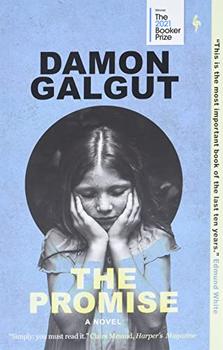Summary | Excerpt | Reviews | Beyond the Book | Readalikes | Genres & Themes | Author Bio

Well, Tannie Marina reflects, at least the child is easy to speak to. She doesn't interrupt or argue and gives the impression she's paying attention, all that's required. It's not a long drive from the school to where the Laubschers live in Menlo Park, but time feels stretched today and Tannie Marina talks in emotive Afrikaans the whole way, her voice low and confiding, full of diminutives, even though her motives are not benign. It's the usual topic, about how Ma has betrayed the whole family by changing her religion. Correction, by going back to her old religion. To being a Jew! Her aunt has been extremely vocal on this subject for the past half a year, ever since Ma fell ill, but what is Amor supposed to do about it? She's just a child, she has no power, and anyway what's so wrong about going back to your own religion if you want to?
She tries not to listen, by focusing on something else. Her aunt wears little white golfing gloves when she drives, an affectation from who knows where, or maybe just a fear of germs, and Amor fixates on the pale shapes of her hands, moving on the steering wheel. If she can keep focused on the hands, the shape of them, with their short, blunt fingers, she will not have to listen to what the mouth above the hands is saying, and then it will not be true. The only thing that is true is the hands, and me looking at the hands.
... The truth is that your mother gave up Dutch Reformed and went back to the Jewish thing just to spite my little brother ... It's so she won't be buried on the farm, next to her husband, that's the actual reason ... There's a right way and a wrong way and I'm sorry to say your mother chose the wrong way ... Well, anyhow, Tannie Marina sighs as they arrive at the house, let's just hope God forgives her and she is at peace now.
They park in the driveway under the awning, with its beautiful green and purple and orange stripes. Beyond it, a diorama of white South Africa, the tin-roofed suburban bungalow made of reddish face brick, surrounded by a moat of bleached garden. Jungle gym looking lonely on a big brown lawn. Concrete birdbath, a Wendy house and a swing made from half a truck tyre. Where you, perhaps, also grew up. Where all of it began.
Amor follows her aunt, not quite on the ground, a few centimetres above it, a giddy little gap between her and things, as she heads for the kitchen door. Inside, Oom Ockie is mixing himself a brandy-and-Coke, his second of the morning. He has recently retired from his government job as a draughtsman in Water Affairs and his days are listless. He jumps to guilty attention when he's bust by his wife, sucking on his nicotine-stained moustache. He's had hours to dress himself properly, but is still wearing tracksuit pants and a golfing shirt and slipslops. A blockish man with thinning hair Brylcreemed sideways across his scalp. He gives Amor a clammy hug, very awkward for both of them.
Sorry about your mother, he says.
Oh, that's okay, Amor says, and immediately starts to cry. Will people be sorry for her all day because her mother has become that word? She feels ugly when she cries, like a tomato breaking open, and thinks that she must get away, away from this horrible little room with its parquet floor and barking Maltese poodle and the eyes of her aunt and uncle sticking into her like nails.
She hastens past Oom Ockie's gloomy fish tank, up the passage, its walls marked with a dimpled-plaster effect popular in these parts at this time, to the bathroom. No need to dwell on how she washes away her tears, except to mention that, even as she continues to snivel, Amor opens the door of the medicine cabinet to look inside, something she does in every home she visits. Sometimes what you find is interesting, but these shelves are full of depressing items like denture cream and Anusol. Then she feels guilty for having looked and to absolve herself has to count the objects on each shelf and rearrange them into a more pleasing order. Then she thinks that her aunt will notice and disarranges them again.
Excerpted from The Promise by Damon Galgut. Copyright © 2021 by Damon Galgut. Excerpted by permission of Europa Editions. All rights reserved. No part of this excerpt may be reproduced or reprinted without permission in writing from the publisher.




The low brow and the high brow
Click Here to find out who said this, as well as discovering other famous literary quotes!
Your guide toexceptional books
BookBrowse seeks out and recommends the best in contemporary fiction and nonfiction—books that not only engage and entertain but also deepen our understanding of ourselves and the world around us.